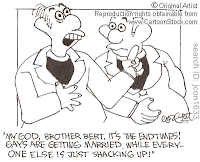Doug Wardlow -GOP 38B - Let's Talk Intolerance!
Dave Mindeman at mnpACT! has posted up on GOP MN House candidate in 38B, Doug Wardlow. He cites Wardlow's anonymous blogging at The Rostra that was maintained while Doug clerked (or do I mean 'while clerking'?). But his anonymous posting of partisan viewpoints wasn't as damming as his over excessive characterization and need to vilify anyone with different views than his own. Like many of the 'talkingheads from the right , Doug Wardlow like to tell us what the 'the liberals', 'the left', 'the media' thinks thereby defining them. He sustains his point of view by distortion and demonizing, vilifying, marginalizing, and trivializing those with different views. It's the classic 'us' and 'them' mentality that leads to unresolved problems while our elected politicians argue on, block and obstruct. From his post entitled " Extreme Liberals: Motivated by Hate " "They hate Republicans, and hate being out o...










